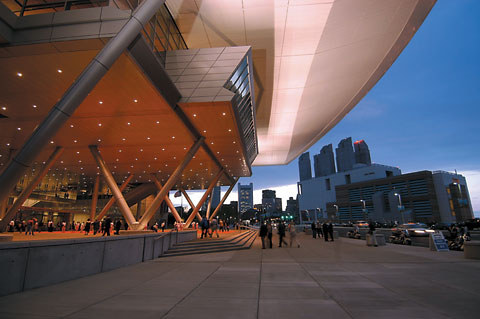
SEA CHANGE With the Urban League conference coming to Boston next week, local leaders are out to dispel old stereotypes about race in the Hub. |
When Boston hosts the American Academy of Pediatrics this October, or the Association for Financial Professionals a month later, nobody will worry too much about how the thousands of convention attendees spend their time. As long as they enjoy themselves, and spend plenty of money, it's all good.But the Urban League conference, taking place next week, is different. Like it or not, this is a major showcase for Boston.
After years of trying to convince groups with large minority membership that the Hub is now a welcoming, friendly destination for African-Americans, this is the first big organization to test the theory.
Some 5000 people from all over the country, mostly racial minorities, are expected to come to Boston (to be joined by another 5000 from this area). Ideally, they will return home with positive tales of their time here. And for that to happen, some say, those attendees need to get out to see the city for themselves.
"Obviously we're bringing a lot of skeptics into Boston," says Darnell Williams, head of the Urban League of Eastern Massachusetts (ULEM), "so we want to expose them to as much of the city as we can."
But Williams, who has used his smooth, patrician manner to gain respect and power in Massachusetts and beyond, has his own skeptics here in Boston.
Some community leaders — not wishing to be named criticizing Williams — fault his leadership in the conference preparations. "He was not ready for prime time," one says.
That critique comes from one of many who could be labeled bitter that Williams has surpassed them in prominence since coming to Boston in 2001, after leading the NAACP chapter in Springfield. But the concern has also been building inside City Hall. And, in the past two months, Mayor Tom Menino has stepped in with his characteristic micromanaging style — demanding meetings, assigning watchdogs, and pulling strings to make sure his city puts its best foot forward. Governor Deval Patrick's administration is also cracking the whip.
"It's coming down from both City Hall and the State House, that this has got to be done right, and done well," says Darryl Settles, long-time Boston restaurant owner and business developer, whose South End site, Darryl's Corner Bar & Kitchen, is a gathering spot for Boston's black professional class.
That unusual interest in the nuts-and-bolts planning for a convention — typically left to the national group running the show — indicates how much is riding on this event in the minds of local officials.
Nobody doubts that the conference itself will be as successful for the Urban League as any of its other annual meetings, held most recently in Washington, Orlando, and Chicago.
But that's not enough for Boston leaders who have been told, repeatedly, for 30 years, that black people won't come to their city. They need this conference to prove that the old stereotypes no longer hold.
And that means two key things. Will attendees from outside the area get to experience the new Boston? And will black Bostonians participate in and benefit from a conference at the new convention center in South Boston?